Science on Stage: searching for the best teachers in Europe Inspire article
In more than 20 European countries, teachers are sharing their inspiring teaching ideas with colleagues, students and the general public via Science on Stage. Eleanor Hayes reviews some of the recent events.
Germany: chocolate and soap bubbles
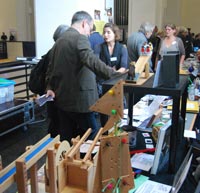
ideas in the fair
Image courtesy of Science on
Stage Germany
On 1 October 2010, 47 of Germany’s most creative science teachers and educators met in Berlin to present their teaching ideas and compete to represent Germany at the Science on Stage international teaching festival in Copenhagen, Denmark, in April 2011w1, w2.
Chemistry teacher Angela Köhler-Krützfeldt and her students, for example, investigated the science of chocolate, while Dieter Legl and Alexander Frisch developed a play: ‘The Light at the End of the Tunnel’, which took a trip through the human digestive system. Martin Busch and Patrick Woldt’s project was similarly creative: their students were ‘hired’ as trainees in a fictional nanotechnology company, where they learned all about what the job involved. For younger students, Wilfried Meyer developed a workshop in which primary-school children investigated the shapes, sizes, colours and other characteristics of soap bubbles.
Representatives of these and eight other projects were chosen to join about 350 colleagues from across Europe, celebrating the importance of science teaching, under the motto ‘Science teaching: winning hearts and minds’, at the Science on Stage international festival.
Hungary: drama in science
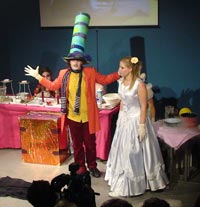
Image courtesy of the
Palace of Wonders
On 2 October 2010, one room of the Palace of Wonders science centre in Budapest, Hungary, was packed: as many as 300 members of the public arrived to watch the demonstrations, performances and experiments at the Science on Stage Hungaryw3 festival, opened by the president of the Hungarian Academy of Sciences, József Pálinkás.
The audience watched with bated breath as chemistry teacher Endre Szórád set fire to a bank note – without damaging it. (It was soaked in a 50:50 mixture of alcohol and water; as the alcohol burned, the water evaporated, keeping the paper below its ignition point.) Also full of drama was the stage performance by Beáta Jarosievitz’s secondary-school students, in which Alice found herself in Chemistryland, and the White Rabbit and his friends guided her through the wonders of chemical reactions. They made ice cream and sorbet using liquid nitrogen, transformed a cup of tea into lemonade and finished the performance with a colourful firework display.
Endre, Beáta and seven other lucky participants were chosen to represent Hungary at the international teaching festival in Copenhagen.
Slovakia: recycling materials for the science classroom
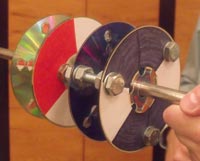
inertia using CDs
Image courtesy of Peter
Horvath
From 4-7 May 2010, the Smolenice Castle echoed with the noise of the Science on Stage Slovakia teaching fair: 50 primary-school, secondary-school and university teachers sharing ideas and inspirationw4.
Peter Horvath, for example, developed ways to teach the moment of inertia of rotating objects, using very simple materials. In one of his demonstrations, he connected CDs together using screws either close to the centre or close to the edge; how did this affect the moment of inertia?
Other activities included simple experiments about the relative humidity of air, electricity and magnetism; a workshop about using coloured wooden blocks to introduce young children to the concepts of torque, centre of gravity and equilibrium; and a presentation about a physics summer camp for children aged 10-15.
The final decision has not yet been made, but representatives of five projects will be heading to Copenhagen in 2011 to share their ideas with their European colleagues.
Romania: reaching out to the public
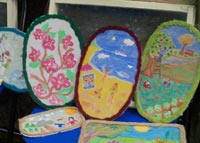
Image courtesy of Science on
Stage Romania
For the organisers of the Romanian Science on Stage eventw5, it was important to involve the public and raise their awareness of science. For this reason, the event took part in the city centre park in Cluj, attracting 800 members of the public, as well as 200 teachers and 1200 school students from both primary and secondary schools.
From each school, teams of students took turns at their stand, describing and demonstrating their projects to visitors. Olga Riscau’s primary-school students, for example, produced their own paper, used it for their paintings – and exhibited the beautiful results on their stand. In the project, Olga and her students were assisted by the science teacher from a local secondary school.
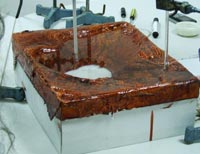
Ursu in Sovata
Image courtesy of Science on
Stage Romania
With so many people involved, it was an important event in its own right – as a chance for teachers and school students to present their ideas, and for the general public to see some of the exciting science that is being done in Romanian schools. In addition, a small number of particularly inspiring projects were selected to attend the Science on Stage international teaching festival in Copenhagen.
Among the lucky winners was Laszlo Papp, whose students built a model of Lake Ursu in Transylvania, central Romania, which simulated both the flow of water through the lake and the heliothermic phenomenon that occurs in saline lakes, causing the water further down to be warmer than at the surface. Other winning projects included Olga’s paper project, Corina Toma’s Jacob’s Ladder, in which a high-voltage electric current climbed two brass rods, Monica Vascan’s impressive model of the kidney and Dana Fenesan’s project about biology and chemistry used in traditional farms in the Carpathian mountains.
Attending the international festival
At each national Science on Stage event, a fixed number of teachers are selected to represent their country at the international Science on Stage festival in Copenhagen. For these teachers, participation will be free.
For other science teachers who wish to attend the international festival, there are a limited number of places for which a registration fee will be charged. See the Science on Stage website for detailsw6.
Web References
- w1 – To find out more about Science on Stage Europe and to contact your national organisers, see: www.science-on-stage.eu
- w2 – To learn more about Science on Stage Germany, see: www.science-on-stage.de
- w3 – For more information about Science on Stage Hungary, see: www.szinpadon-a-tudomany.hu
- w4 – To find out more about the Science on Stage Slovakia event, see: www.science-on-stage.sk
- w5 – For more information about Science on Stage Romania, see: www.isjcj.ro/scienceonstage
- w6 – To learn more about the international festival and how to apply to take part, see: http://science-on-stage.eu/?p=3
Resources
- After each of the previous international Science on Stage festivals (and the Physics on Stage festivals that preceded them), the Irish delegates produced a book describing how to carry out their favourite experiments in the festival. These books can be downloaded free of charge from the Science on Stage Ireland website: www.scienceonstage.ie/resources.html





